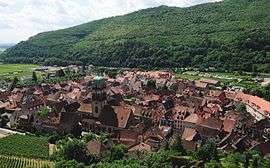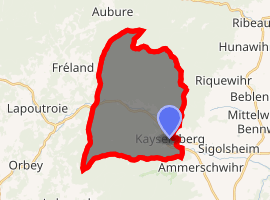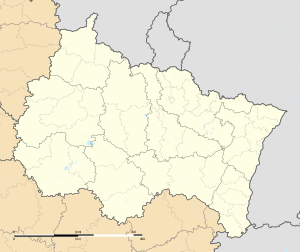Kaysersberg
Kaysersberg (German: ![]()
Kaysersberg | |
|---|---|
Part of Kaysersberg-Vignoble | |
 The town seen from its castle | |
.svg.png) Coat of arms | |
Location of Kaysersberg 
| |
 Kaysersberg  Kaysersberg | |
| Coordinates: 48°08′N 7°16′E | |
| Country | France |
| Region | Grand Est |
| Department | Haut-Rhin |
| Arrondissement | Colmar-Ribeauvillé |
| Canton | Sainte-Marie-aux-Mines |
| Commune | Kaysersberg-Vignoble |
| Area 1 | 24.82 km2 (9.58 sq mi) |
| Population (2017)[1] | 2,489 |
| • Density | 100/km2 (260/sq mi) |
| Time zone | UTC+01:00 (CET) |
| • Summer (DST) | UTC+02:00 (CEST) |
| Postal code | 68240 |
| Elevation | 236–924 m (774–3,031 ft) (avg. 240 m or 790 ft) |
| 1 French Land Register data, which excludes lakes, ponds, glaciers > 1 km2 (0.386 sq mi or 247 acres) and river estuaries. | |
The inhabitants are called Kaysersbergeois. The name is German for Emperor's Mountain.
The high fortress that dominates the city serves as a reminder of both its strategic importance and its warlike past. Together with the rest of Alsace-Lorraine, Kaysersberg was annexed by Germany during a period of 48 years, between the Franco-Prussian War and the First World War.
Kaysersberg is one of the finest wine-growing areas in Alsace. The first vines were brought there in the 16th century from Hungary, and wine production is still an important aspect of the town's economy today. Wine produced from the pinot gris variety is a local specialty.
Geography
Kaysersberg lies northwest of Colmar, on the eastern slopes of the Vosges mountains.
Population
| Year | Pop. | ±% |
|---|---|---|
| 2006 | 2,715 | — |
| 2007 | 2,720 | +0.2% |
| 2008 | 2,726 | +0.2% |
| 2009 | 2,721 | −0.2% |
| 2010 | 2,713 | −0.3% |
| 2011 | 2,709 | −0.1% |
| 2012 | 2,705 | −0.1% |
| 2013 | 2,701 | −0.1% |
Notable people
Kaysersberg was the birthplace of Albert Schweitzer (1875–1965), theologian, musician, philosopher, and physician and Matthew Zell, Protestant reformer.
Gallery
 Typical view of Kaysersberg
Typical view of Kaysersberg Another typical view of Kaysersberg
Another typical view of Kaysersberg- The medieval church
- Fountain and facade of Holy Cross Church
- 1518 altar inside the medieval church
- Kaysersberg's Renaissance town hall
- Albert Schweitzer museum
 Kaysersberg is dominated by the ruins of its castle
Kaysersberg is dominated by the ruins of its castle- The Kaysersberg Castle
 Cemetery and vineyards
Cemetery and vineyards Bell tower and roofs seen from Schlossberg
Bell tower and roofs seen from Schlossberg Maison Herzer
Maison Herzer Gebäude
Gebäude
See also
- Communes of the Haut-Rhin département
References
- Téléchargement du fichier d'ensemble des populations légales en 2017, INSEE
- Arrêté 14 July 2015 (in French)
